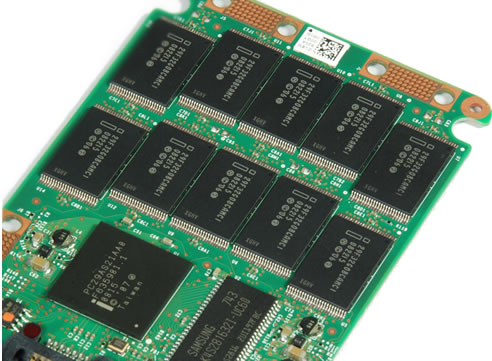Intel X25-M 80GB
Last year Intel released the X25-M solid state drives in 80GB and 160GB capacities, taking everyone by surprise with performance that was widely and wildly acclaimed as amazing.
Before the Intel drives, MLC flash SSDs were suffering from bad performance and the more expensive SLC (single-level cell) drives were all the rage. It was starting to look as though MLC had to be avoided like the plague and that we would have to wait for SLC technology to become more mainstream.
The X25-M changed all that. Though it hardly made the technology affordable, it brought performance comparable to that of high-end SLC flash SSDs to a more realistic price range. While the G.Skill Titan 128GB is currently selling for $270, the 80GB Intel X25-M will set users back a hefty $390, so it is far from what we would call mainstream, but it is better than the $760 users will pay for the 64GB SLC version.

Intel was able to achieve SLC-like performance with their MLC based X25-M drives by using multi-channel flash. Using Intel's own PC29AS21AA0 controller the X25-M is able to address ten different MLC flash channels at once, using a 16MB cache. Furthermore, this controller incorporates native command queuing (NCQ), allowing them to efficiently distribute read and write operations across the available channels.
The 16MB cache is used for write amplification control and this, in short, improves the reliability and performance of the X25-M. Typical flash drives will write small amounts of data at the minimum block size. This means if the drive was to write just 4KB of data it would need to write to the entire block, which could be as much as 128KB, and this is why MLC generally offers poor write performance.
Something you may have found interesting about certain SSDs such as the X25-M is that they come in capacities such as 80GB and 160GB, rather than the 64GB and 128GB capacities that we are accustomed to. This is because 50nm NAND flash memory feature a 4GB capacity per chip and the X25-M uses 20 of them, giving a total capacity of 80GBs.

The Intel specification for the X25-M drives state that the read performance will be "up to" 250MB/s and write up to 70MB/s, which to us indicates that not all models will perform alike. While the claimed read performance is slightly higher than that of the Titan, the write performance is considerably lower, and this is something we will be looking into once we begin benchmarking.
Intel claims that the X25-M has a MTBF (Mean Time Between Failures) of 1.2 million hours. Like the G.Skill Titan this is quite a high estimation, though it is impossible to prove how accurate this is without over a million hours of use. Additionally, Intel claims that the drive will withstand 1000G shock resistance which is slightly lower than what G.Skill were claiming.
